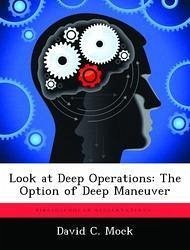The idea of interdicting lines of communication, restricting the employment of reserve forces, destroying supply bases, or cutting off routes of withdrawal has been the object of deep operations throughout the history of modern warfare. This paper seeks to address the implications of deep operations doctrine in regard to maneuver capability. It begins by exploring the concepts of deep operations through the analysis of military theorists like Carl von Clausewitz, J.F.C. Fuller, B.H. Liddell Hart, Don Starry and Richard Simpkin. Next, it validates the deep operations concept by examining the theory's implementation by the Germans in Russia, 1941, the U.S. 4th Armored Division in Western Europe, 1944 and more recently by the Israelis in the Sinai, 1967. Finally, this study reviews the evolution of contemporary deep operations doctrine. It explores the dynamic balance between firepower and maneuver and how the nature of battle continues to change as each takes the dominant role. The concept of deep operations is still valid in contemporary warfare. However, at present we are relying on technology to provide a firepower solution to deep operations at the expense of maneuver. This firepower solution provides the enemy with a one dimensional, relatively simple problem to solve. The paper concludes that success on the modern battlefield will come only from a balanced approach of fires and maneuver in the deep battle.








